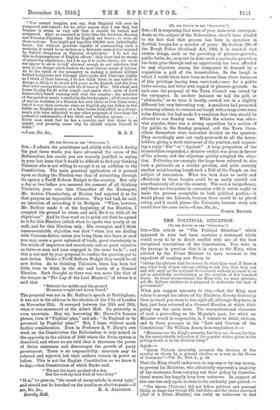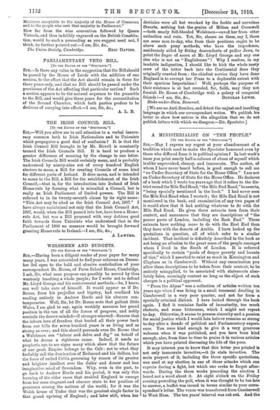THE POLITICAL SITUATION.
[To THE EDITOR OF THE " SPECTATOR:1
Sin,—The article on "The Political Situation" which appeared in your last issue contains a statement which would seem to be in direct conflict with one of the best recognised conventions of the Constitution. You state in the passage in question that it is open to the King, when advised by the Prime Minister to have recourse to the expedient of creating new Peers, to
"inform his advisers that he cannot do what they want if there is any other body of men who are willing to tell him that they can and will carry on the national Government without recourse to an act so admittedly revolutionary as the creation of five hundred Peers. In these circumstances the King will, we must presume, ask Mr. Balfour whether he is prepared to undertake the task of government."
What you suggest amounts to this,—that the King may refuse to accept the advice of his Ministers, thereby dismissing them (a result you seem to lose sight of), although they have, in fact, just been returned at a General Election at which their
policy was the main issue. The unconstitutional character of such a proceeding on his Majesty's part, for which no Minister would be responsible, is, I venture to think, obvious, and in three passages in his "Law and Custom of the Constitution" Sir William Anson thus emphasises it :—
"Ministers aro the King's servants, but they are chosen for him by the umnidakable indication of the popular wishes given in the polling-booth or in the division lobby."
Again:— "Queen Victoria invariably accepted the decision of the country as shown by a general election or a vote in the House of Commons."—Vol. II., Part I., p. 39.
That the King should endeavour, in any way or by any means, to prevent his Ministers, who admittedly represent a majority of the electorate, from carrying out their policy by Constitu- tional means has happily long been unknown. In support of this one has only again to turn to the authority just quoted
"The Queen [Victoria] did not follow political and personal liking, as Anne and George III. had done, and the choice exercised [that of a Prime Minister] was really an endeavour to find
Ministers acceptable to the majority of the House of Commons, and to the people who sent that majority to Parliament."
How far from the wise convention followed by Queen Victoria, and thus indelibly engraved on the British Constitu- tion, would be such a proceeding as you suggest need not, I think, be further pointed out.—I am, Sir, Ste.;
The Union Society, Cambridge, ERIC DAVIES.







































 Previous page
Previous page